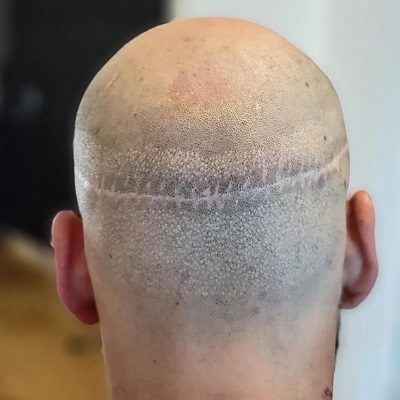
Hair loss can be induced by various circumstances, including disease, medication, a poor diet, hormones, and excessive style. All of these factors can disrupt the hair development cycle, preventing hair follicles from producing new hair. We shed 50-100 hair strands every day while our hair grows 12 inches per month. Yet, if you notice more severe hair loss or poorer hair growth, this might be a sign of hair loss. In women, indications of hair loss may include thinning hair or a progressive widening of the scalp near the top of the head. Bald spots on the tops of men’s heads are standard. At the age of 50, almost half of all persons experience hair loss.
Did you know that a lack of nutrients promotes hair loss?
Yes, many individuals are unaware that diet has a significant impact on hair development. What exactly is a nutrient deficiency? It is due to a lack of specific vitamins and minerals. Hair development is a complicated metabolic process that necessitates the consumption of several minerals, vitamins, and enzymes. Hair loss can occur if you are vitamin deficient, and your hair will not develop to its full potential.
This blog, offered, discusses which vitamins and minerals are ideal for hair. How it is necessary for hair development and foods that contain a specific type of vitamin. If you use these vitamins in your daily routine you can avoid the cost of hair transplant in Dubai.
How may a lack of nutrients induce hair loss?
Proper diet and hair care can help to prevent hair loss and encourage hair growth. In many situations, hair loss is induced by a vitamin deficiency, which causes a condition known as Telogen Effluvium, which momentarily shifts the hair from the growth phase to the relaxing stage, resulting in hair loss. Telogen effluvium is a transitory condition that may treat by increasing your intake of crucial vitamins that promote healthy hair development. Taking vital minerals and proteins can help prevent hair loss caused by a lack of vitamins or other dietary deficiencies. Take care of your hair and consume a healthy diet.
Another method of preventing hair loss caused by a lack of nutrients is to take supplements prescribed by a doctor based on a diagnosis.
So, what vitamin deficiencies result in hair loss?
Hair loss due to vitamin C deficiency:
Vitamin C is an excellent antioxidant and essential for the immune system, collagen formation, and iron absorption. Hair loss or brittle, fragile hair might result from a vitamin shortage.
It is needed for the growth and restoration of all tissues in the body. It aids in the creation of collagen, which is a necessary protein for healthy skin and hair. Vitamin C is also required for wound healing and the maintenance of strong teeth and bones.
As vitamin C is an insoluble vitamin, the body cannot keep large amounts of it. As a result, it must be supplemented through your diet.
- Dark leafy veggies
- Green and red peppers
- Potatoes
- Broccoli
- Brussels sprouts
- Spinach
- Citrus fruits are high in vitamin C.
Hair loss caused by a lack of vitamin B-complex:
There are eight B complex vitamins (B1, B2, B3, B5, B6, B7, B9, and B12) that promote a variety of body processes, including healthy cell creation (B1), free radical damage prevention (B2), and brain performance and mood support (B3) (B9).
Biotin
Biotin deficiency can result in dizziness and exhaustion, as well as hair loss and brittle hair. Biotin (B7), in particular, promotes hair development by increasing hair protein structure, which is part of the visible hair structure. Biotin deficiency manifests itself in two ways: hair loss and dry skin. Biotin is abundant in dairy products, eggs, legumes, and meat.
Vitamin B-5 (pantothenic acid):
While biotin is the most well-known B complex vitamin for hair development, B5, or pantothenic acid, since vitamin B5 can promote hair development, it is found in many hair growth products. A deficiency of inositol and pantothenic acid causes hair loss, according to research on a pure diet. Chicken, eggs, milk, almonds, meat, and potatoes are high in vitamin B5.
B-6 vitamin (pyridoxal-5-phosphate)
Hair growth is a multi-step metabolic process involving hundreds of chemical interactions. Vitamin B-6, also known as pyridoxal-5-phosphate, is engaged in at least 100 different strategies that regulate protein, lipid, and gluconeogenesis. Protein synthesis results in your hair. The lipids or oils generated by the scalp give gloss to beautiful hair. Vitamin B-6 is an excellent vitamin for hair loss due to its protein and lipid metabolism function. Cheese, salmon, poultry, greens, and seeds are all excellent sources of vitamin B-6.
Vitamin B-12
It is needed for the formation of red blood cells. Blood is made up of red blood cells that transport oxygen and vitamin B-12 is necessary to form enough red blood cells. Adequate blood circulation promotes hair growth. Low blood vitamin B12 levels are a prevalent symptom in people with hair loss, particularly telogen effusion. Vitamin B-12 may be found in beef liver, seafood, dairy products, eggs, and fortified grains.
Hair loss caused by a lack of vitamin B-9 (folic acid)
Folate, commonly known as vitamin B9 or folic acid, is essential for DNA, RNA, and protein synthesis. Hair creation involves all of these stages. Folic acid is found in various cereals and cereal products and nuts, green vegetables, and berries.
Folate deficiency can lead to anemia and disrupt appropriate oxygen and nutrition delivery to hair cells.
Vitamin D deficiency and hair loss:
While vitamin D’s primary function is to maintain adequate calcium and phosphorus levels in the blood, research indicates that vitamin D also plays an essential part in hair development. Vitamin D is vital for the immune system. The immune system can occasionally assault the body’s follicles, resulting in hair loss and poor growth. Alopecia areata and alopecia totalis are two examples of autoimmune disorders. Vitamin D pills aid in the treatment of acute inflammatory responses that impede hair growth. Alopecia areata treatment is available in our clinic in Dubai.
While your body is exposed to UV rays from the sun, it produces vitamin D endogenously. This implies that you won’t require vitamin D tablets if you spend a lot of time outside. Because vitamin D encourages hair development, if you don’t get much sun or cold outside, you should invest in some or take vitamin D supplements.
Vitamin D is naturally found in different foods:
- Oily fish
- Cod liver oil
- Some mushrooms
- Fortified meals
- Eggs
- Yogurt
Iron:
Iron aids in the transfer of oxygen to all bodily cells via red blood cells. This mineral is essential for biological activities, including hair development. Anemia is caused by iron deficiency, which is also a leading cause of hair loss. This is quite frequent among women. Iron-rich foods include shellfish, oysters, eggs, processed meats, spinach, and lentils.
Conclusion!
While some hair loss is natural, if you notice more than 50-100 hair losses each day, it is time to take action to avoid the onset of hair loss symptoms. Adjustments in hairdo, lifestyle changes, and dietary improvements are all examples of essential hair care to prevent hair loss.
Make lifestyle adjustments, such as reducing stress, to avoid hair loss. To keep calm and focused, exercise regularly, attempt meditation, and take deep breaths. Emphasis daily might promote thinning and possibly failure. If you believe you are still not receiving a healthy hair loss diet, and you need hair loss treatment in Dubai speak with experts at Dynamic Clinic; to schedule an appointment, call +971 561772998.


































